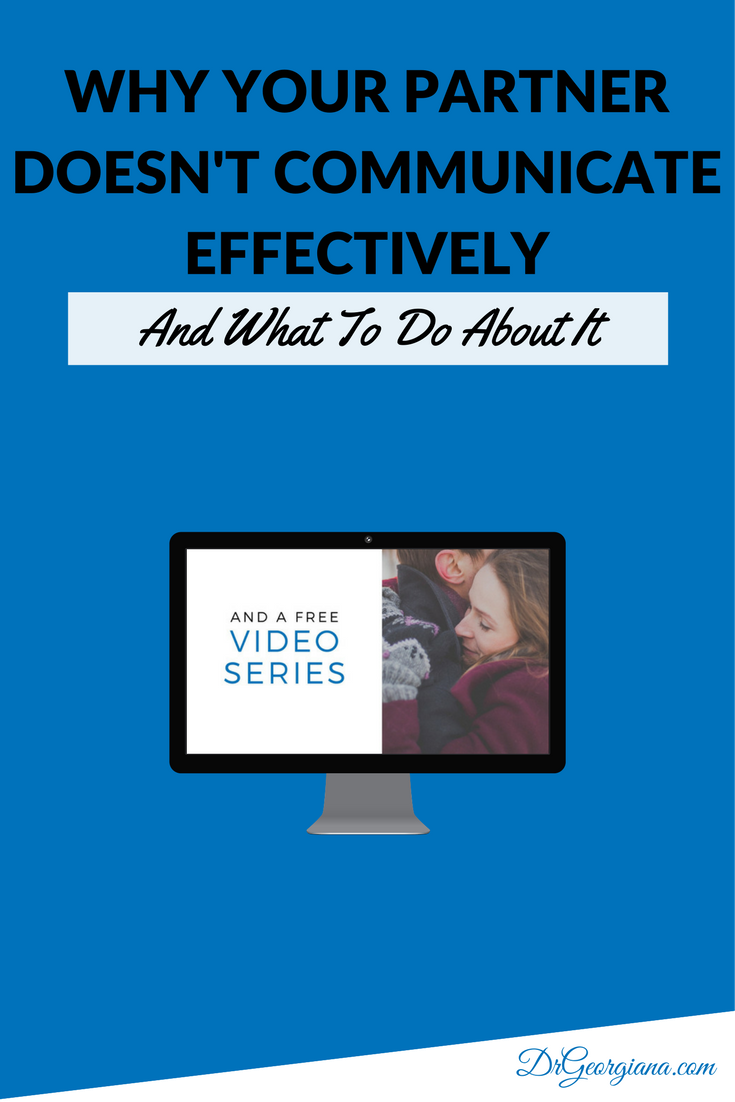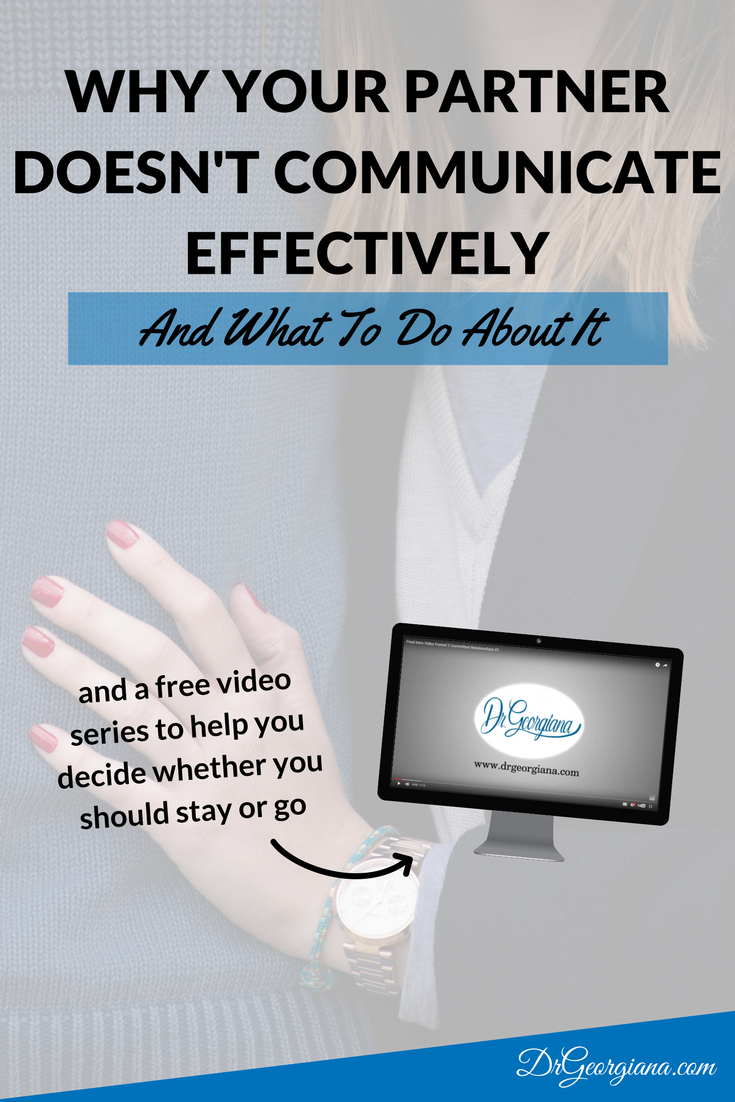
Welcome to the “Ask Dr. Georgiana” Relationship Series. This week we’re going to discuss the lack of acknowledgment many individuals feel during arguments with their partner and what one can do to help their partner use more effective communication.
Have you ever felt frustrated during a conversation in which your partner answered “Yes…but” in response to a point you were making?
Although it is obvious that two people cannot agree on everything, if you felt at the time that both your point of views had some validity and contained similar elements, it would be reasonable for you to be upset at the lack of effective communication.
Focusing on differences of opinion rather than on similarities during a conversation is a very common habit that often leads to unnecessary conflict.
I created this article in response to a question I received from Miriam in Salt Lake City, Utah. She wrote:
“Dr. Georgiana. I am tired of arguing with my partner over the silliest of things. Every time I say something, he responds ‘yes, but…’ and no matter how hard I try to present my point of view, he maintains a perspective opposite to mine.
Last week, we were having a discussion about his ex-girlfriend and I expressed a concern about her coming to our house when I was not there. I reminded him that at a recent party, we had both made it clear to her that we accepted her friendship under the condition that she only spent time with us as a couple. One week later, she overlooked it and showed up unannounced at our house when I was out of town and my partner was running errands with my mother.
My partner replied that I was being insensitive, as the ex-girlfriend had tried to call and neither of us had answered the phone. I was speechless at the lack of effective communication and felt at a loss. It seemed I had a right to be upset. Why couldn’t he acknowledge my thoughts and feelings and then present his perspective afterwards? This is a constant problem in our relationship. What is going on and what can I do?”
Now, Miriam’s issue with her partner’s struggle with effective communication is certainly frustrating and a shame, but highlights an interesting point. Most of the time when a couple has differences in opinion, there are still some similarities in their thinking. In the heat of the moment, we forget that the focus of the argument should be on resolution and compromise, not proving the other to be wrong. Though it may seem counterintuitive at first, the couples with the most effective communication find their middle-ground first and then state the differences. Doing this does wonders for the relationship and allows both people to walk away from a conversation feeling validated and accepting of the other person’s perspective.
So what could be going on when a person fails to use effective communication and has the “yes, but” habit? Although there are countless possibilities, here are the three most common:
- They may be afraid that you will not consider their point of view, so they assert themselves by overlooking what you are saying.
- They may be impatient and instead of taking the time to consider your perspective and how it may affect their response, they rush to make their perspective heard.
- There may be unresolved conflict in the relationship that makes the person feel defensive and not want to yield to you.
Usually, telling your partner why you think they do what they do yields less than satisfactory results. Instead, it’s better to explain to them the impact this way of communicating is having on you and the relationship.
Here are three scenarios to be aware of:
Scenario #1: You feel unheard and withdraw from expressing your thoughts.
Scenario #2: You argue with them, do not acknowledge their perspective, and your conversations break down.
Scenario #3: You are angry for not being heard and retaliate by not being present or sensitive to their needs.
None of these three scenarios are beneficial for either of you and having an open line of communication will help.
In order to illustrate your point, you may want to choose an example from past interactions that will not generate an emotional reaction in your partner.
In Miriam’s case, she could easily use the example she described to raise concerns about the deeper reasons causing her partner to overlook her comments.
The most important conclusion from this is whether effective communication is even possible with the person you are committed to. If you cannot resolve it on your own, I suggest seeking professional help. If that does not work, you must realistically assume your partner is unwilling to help the relationship get better and easier over time.
I am honored to be part of your journey finding and keeping the right partner and look forward to sharing future articles with you, speaking with you in one of my online relationship programs, or having a personalized Relationship Coaching session.
Your comments are very important to me and help me guide future article choices. PLEASE SHARE YOUR THOUGHTS WITH ME. You can comment below, or on my Facebook page. I will read all of your comments and make every effort to address your questions, struggles and concerns in future articles.
ABOUT THE AUTHOR
Author Georgiana Spradling, Ph.D., MFT, CDVC, is a multicultural and multilingual (English, Spanish, & French) Emotional Intelligence Relationship Coach with over 20 years of experience helping people choose the right partners and avoid the wrong ones, manage emotions and behaviors in self and others, leave unhealthy partnerships, and move past old relationships. She is a Certified Domestic Violence Counselor and has a Certificate as an Anger Management Facilitator. Her e-book: “Don’t Get Stuck with the Wrong Partner: Learn to Detect Unhealthy Traits and Behaviors in Others” is available on Amazon Kindle. You can subscribe to her YouTube channel on the undesirable sides of dating, committed relationships, separation and divorce at http://bit.ly/AskDrGYT and sign-up to her online news bulletin at www.drgeorgiana.com.
Dr. Georgiana coaches on the telephone, online or in her office in San Francisco (USA) and offers a FREE 25-minute Consultation. She can be reached through her website: www.drgeorgiana.com, by e-mail: gs@drgeorgiana.com or phone: 1-650-731-5105.


